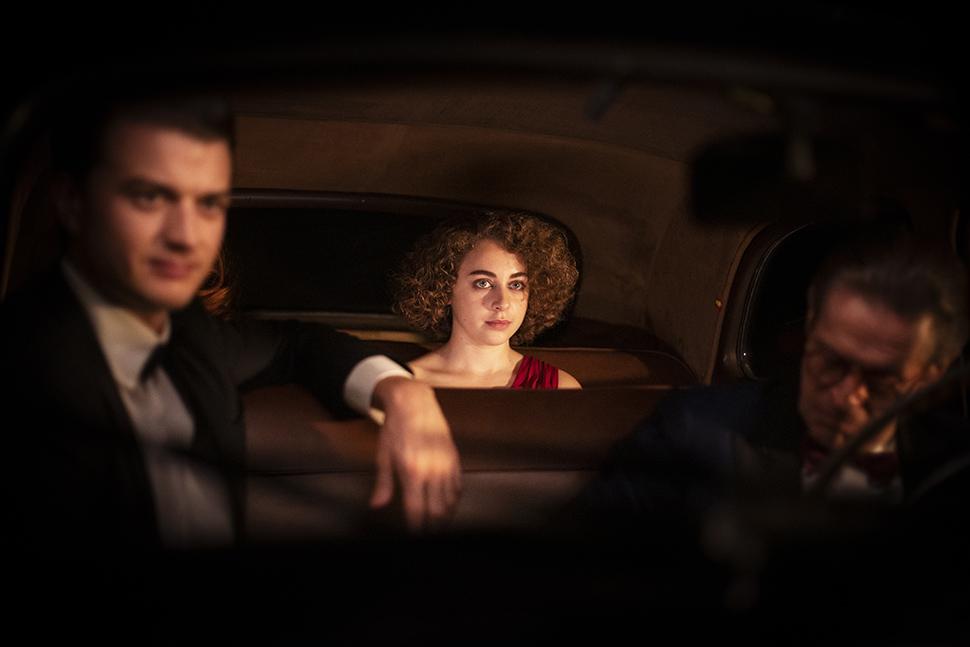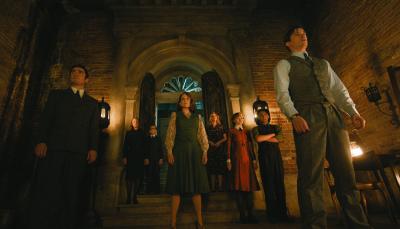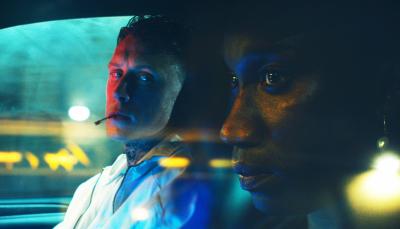'Finally Dawn's Storytelling Instincts Squander an Interesting Perspective of Film History

Lily James as Josephine Esperanto in 'Finally Dawn'
Wildside/Rai Cinema
So much about Finally Dawn (Finalmente L’alba) feels perplexing. It gives the perspective of a regular Italian adolescent through a world of questionable showbiz glamor, but we rarely get insight into her interiority. It’s set against the backdrop of Hollywood productions that set up shop in Rome in the 50s, but it’s shot in such a graceful, modern way that it undermines the classic vibe of the characters – namely, British starlet Lily James playing a commanding Hollywood star of the Bette Davis kind. It clearly wants to give scathing commentary on the behind-closed-doors power abuses of Italian society, but its impact is numbed by the inert pacing and story.
Finally Dawn probably works best as a pithy blurb summing up all that’s noteworthy about it, handily omitting that everything interesting about the finished product is stranded in an intolerably long and dull film.
A lot of Hollywood seems to be understood solely from the history of subsidies. To a producer, there’s nothing more appealing than local, international, and government tax breaks and bonuses. In the wake of the Allied Victory in World War II, Italy’s film production lot Cinecittà (initially founded by Mussolini’s Fascist government) sat empty and waiting for American money to help revitalize their industry. Thus, “Hollywood on the Tiber” was born, with classics such as Quo Vadis?, Roman Holiday, Ben-Hur, and Jason and the Argonauts taking advantage of the stunning vistas and cheap labor.
Finally Dawn is an Italian-English drama following a young Roman woman, Mimosa (Rebecca Antonaci, in her feature film debut), as she gets swept up in the romance and bitterness of fictional Hollywood celebrities (played by Lily James, Joe Keery, and Rachel Sennott) over the course of a single night in the middle of an American swords-and-sandals production. Saverio Costanzo, creator and director of HBO’s My Brilliant Friend, tries to infiltrate the robust bravado of US studio filmmaking with a modern style that evokes the visions Italy would develop domestically with greats such as Fellini and Rossellini.
What if the people making American movies could also, without knowing it, be at home in gritty, nuanced drama and also roam dreamlike, melancholic, almost spiritual worlds – a neorealist and expressive blend that would inscribe Italian cinema in history books? By compositing heightened and grounded storytelling quirks, Costanzo tries to give us a glimpse into the world behind the silver screen – as if no matter how Anglicized the productions that shot there were, nobody can escape the classic-but-modern texture of Italy seen in its cinema.
It seems a worthy attempt at excavating a busy time in Italian post-war culture, and for the best part of an hour, Finally Dawn convincingly leads you on its sprawling, unfocused journey. Here, the gradual way we’re led out of the mundane but taxing expectations of domestic Roman life is welcome; Costanzo flexes the skills he gained by adapting Elena Ferrante’s Neapolitan Novels, showing the excitement of two sisters articulating their desires and the punishing but amusing behavior of their domineering and typically Italian parents.
But even in the first act, Mimosa’s insisted timidness during any moment attention is on her becomes tiresome, and even though being sucked into the world of Hollywood divas, ingenues, and heartthrobs should offer her an unconventional road to emotional liberation, Mimosa remains insular and petrified until the film’s laughable final beat. Having a protagonist with no agency or influence on the story she’s wrapped up in is a fatal flaw for any drama, least of all one that clocks in at a punishing 140 minutes.
Isolated moments of tension, pathos, and venom come courtesy of Finally Dawn’s sprawling ensemble: the Hollywood crew bounce between egotism and kindness with whiplash-inducing speed, only ever seeing Mimosa as an object to feed their narcissism or use as a chess piece against their rivals. While this is obviously a cruel thing to do, Mimosa’s threadbare characterization doesn’t do her any favors – she’s not exactly a three-dimensional presence in the narrative. As Josephine Esperanto, James struggles to find the right balance in the character’s opaqueness and transparency, making her performance not much more than a collection of differently intense stares.
Keery, Sennott, and a very welcome Italian-speaking Willem Dafoe do their best with obvious but not insufferable writing but ultimately can’t make up for a story that submerges you in the frustrating and hypocritical demands of a cruel industry at the most leisurely pace, expecting us to be shocked and transfixed by the most superficial debaucheries. The last thing on Finally Dawn’s mind is how to properly write compelling drama; Babylon is 40 minutes longer, does more or less the same thing, and feels half the length. Finally Dawn squanders an interesting perspective of film history with the worst storytelling instincts.





